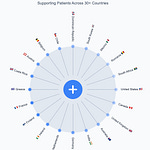In this week’s episode, Ryan Prior, author of The Long Haul, shares his insights on patient advocacy, long COVID, ME/CFS, healthcare technology, and precision medicine. We discussed many questions, including:
What kind of symptoms does long COVID cause?
How has the pandemic highlighted the need for patient advocacy?
What is precision medicine?
What is the role of genomic innovation in healthcare?
How can we make healthcare technology more accessible?
How can we ensure that clinical research includes diverse populations?
What kinds of accommodations should be made for long haulers?
What does an inclusive society that embraces disability look like?
Listen now on Apple, Spotify, Amazon Music, and YouTube.
Chapter Summaries:
[00:01:04] At the beginning of the pandemic, public health messaging falsely presented COVID-19 outcomes as binary, and long-term, complex post-viral illness was not acknowledged.
[00:03:13] Many patients with complex chronic illnesses share similar experiences, and finding camaraderie among other patients can be validating.
[00:05:54] The Patient-Led Research Collaborative, an offshoot of The Body Politic COVID-19 support group, is an example of patient-led activism. Ryan argues that lived experiences can be more powerful than medical education in instances where clinical knowledge is lacking.
[00:09:20] Medical gaslighting occurs when patient symptoms are psychologized. This phenomenon likely occurs due to lack of medical education surrounding long COVID, ME/CFS, and other complex chronic illnesses.
[00:14:21] Long Covid and ME/CFS share many overlapping features: reduced blood flow to the brain, gastrointestinal dysbiosis, mutated mitochondrial DNA, impaired immune cell activity. A “theory of everything” could also help explain other immune-associated complex chronic illnesses such as Ehlers-Danlos syndrome (EDS), postural orthostatic tachycardia syndrome (POTS), mast cell activation syndrome (MCAS), dysautonomia, and fibromyalgia. Ryan advocates for the creation of a new NIH body dedicated to complex chronic diseases.
[00:18:58] The infectious hypothesis of Alzheimer’s disease may help explain the increased risk of dementia observed after COVID-19 infection.
[00:23:58] Precision medicine is costly in the short term but could save billions in the long term. The cost of sequencing a genome has rapidly dropped in the last decade, but a new generation of doctors has to be trained on how to implement genomics data in the clinic.
[00:28:41] The majority of data collected for genome-wide association studies comes from WEIRD (western, educated, industrialized, rich, democratic) populations. Science doesn't take into account the female perspective.
[00:32:09] Healthcare technology can allow anyone to collect data and become a citizen scientist, helping to include traditionally underrepresented groups in medical research.
[00:34:15] There is power in pooling all the information that patients know collectively to solve some of their most pressing issues. Patient communities like Alike Health and Stuff That Works try to leverage the collective unconscious of a community of people who all have a similar diagnosis.
[00:36:00] Mike Snyder, a pioneer of wearables at Stanford, has been tracking all of his data for the last ten years using a variety of wearable devices. Using heart rate variability data, he was able to preempt a diagnosis of Lyme disease.
[00:40:57] Long COVID may be responsible for up to one third of the current labor shortage in the United States. Enabling people with disabilities to participate in the workforce means prioritizing proper accommodations, remote work, flexible hours, and rest.
You can pre-order your copy of The Long Haul in bookstores everywhere on November 15th, 2022. Learn more about Ryan and his advocacy work on his website.
Follow me on LinkedIn where I will be sharing more insights into patient advocacy, healthcare technology, and the quantified self over the next few weeks as part of LinkedIn’s Creator Accelerator Program: Technology & Innovation.










